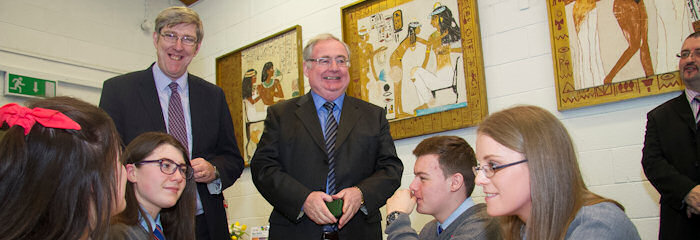Cross-border MoneySense for School’s gets thumbs up from Ministers

Two schools from Belfast and Tallaght have won the backing of Ministers North and South of the island for their cross-border collaboration on MoneySense for Schools.
Belfast Model School for Girls in north Belfast travelled to St Mark’s Community School, Tallaght, to take part in the Ulster Bank MoneySense session – 60 pupils from both schools participated.
The Ministers, John O’Dowd MLA and Pat Rabbitte witnessed the students in action as they learned all about borrowing money and managing`debt. This was the second time the schools ran a joint financial education session; this time they worked in mixed teams to learn about different loan options available when borrowing money, how interest is calculated, the importance of making payments on time and how people get into financial difficulty.
Both Ministers said they were delighted to see students working together; discussing their own views on how important it is to manage money and to borrow responsibly.
John O’Dowd, Education Minister for Northern Ireland said:
| It is vitally important that we equip young people with the skills they need to manage money. When they leave school, whether it be for employment, training or to go into further or higher education, young people are at an age where many are earning through part-time work or other means. Skills like budgeting; saving, interest on credit or store cards and prioritising essential costs and bills can stand them in good stead for the rest of their life. The Executive is committed to developing a financial capability strategy to give consumers, including young people, the skills and information they need to manage, plan and take responsibility for their financial affairs. Education is an important component of developing these skills. |
Minister Rabbitte in his address to the school said:
| What we’ve seen today is a powerful example of active learning – the students have seen how basic maths skills like calculating borrowing costs apply to real life. We are moving away from rote learning towards empowering our students to think for themselves through reform of the junior cycle. I am delighted that my own Department has been in a position to support this transition through investment in high speed broadband connectivity to all second-level schools, including St Mark’s. In this way, more collaborative, research-based learning through use of the internet and ICT tools in classrooms has been made possible. Initiatives like MoneySense are a great example of new and flexible approaches to personal finance education which can help prepare our young people for the real-life decisions they will face in the future. |
Ulster Bank Chairman, Dr. Philip Nolan also attended the event and spoke about the bank’s long-standing commitment to financial education:
| It’s an essential life skill for teenagers to learn how to manage money, budget and make informed decisions, so that as future adults they have the ability to deal with life’s financial challenges. We recognise our role as a bank in helping young people to understand personal finance, and that’s why we continue to invest in MoneySense for Schools. Financial health is a positive outcome that will improve the quality of a student’s life both now and in the future, helping them achieve their goals, become confident consumers and avoid costly xand distressing mistakes |


